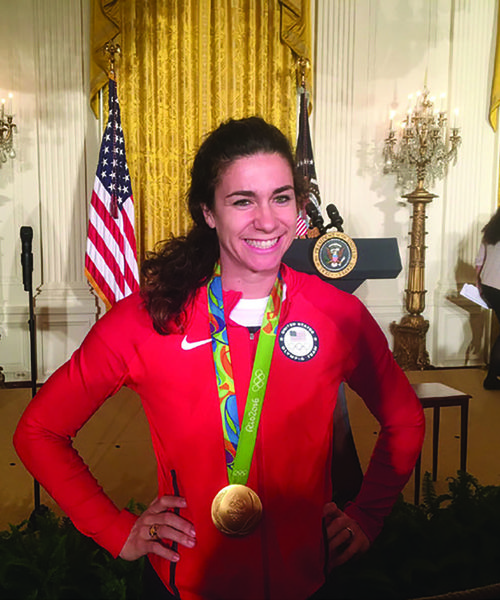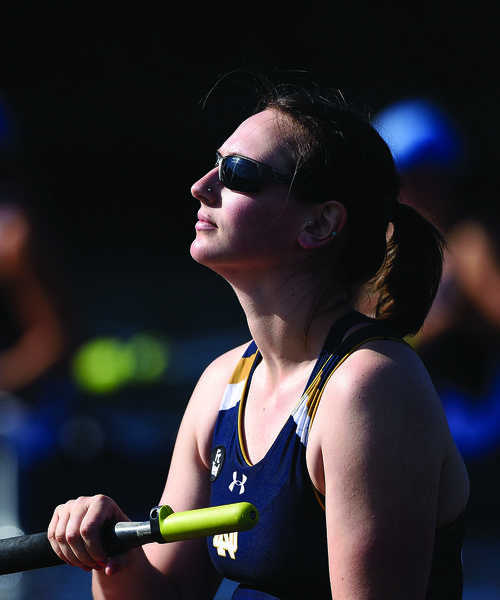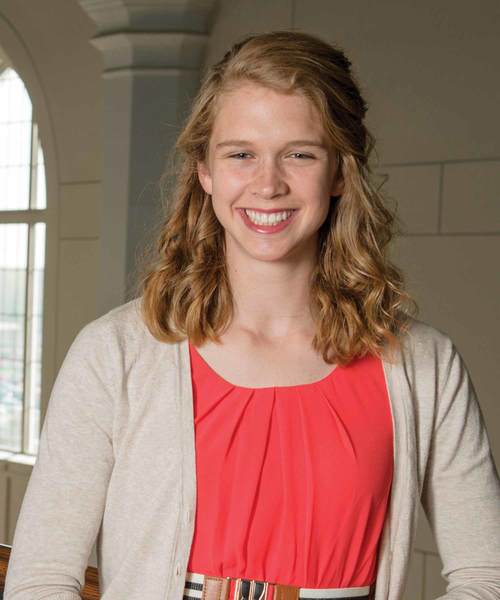
Amanda Polk
'Don't Ever Give Up
There so often comes a time in the life of any athlete when there is a choice to be made.
There is frustration.
There is disappointment. There are tears.
There are thoughts of quitting.
And then something else happens at that crossroads that pushes the needle back the other direction.
Suddenly, there is renewed energy.
Once more there is that undeniable competitive spark.
Here returns that push to be the best.
That, too, was former Notre Dame rower Amanda Polk — living out the extremes of emotions.
And the end result? A Summer Olympic Games gold medal.
In the beginning, growing up in Pittsburgh, there was soccer, then basketball, then softball — and then there were ballet and dance.
“But I always wanted to be in the action,” remembers Polk.
Her mother, Joann, recalls the biggest priority: “Because of the basketball reputation at Oakland Catholic High School, she strived to become a varsity player.”
Her father, Kenneth, says, “She had a particular role, and I said, ‘Amanda, your job is to just carry people with you to the basket.’
“She would get in there and it almost looked like a scrum in rugby. Up to the basket she goes and people are fouling her left and right. And I said, ‘You just did what the team needed.’”
Then along came rowing.
“One of my friends was on the rowing team and she introduced me,” says Amanda. “And I thought it would be a great tool to help me with basketball and with getting stronger.”
Amanda’s sister Jessica was leery at first: “I’ll never forget when she came home and said she was going to row.
“But she was really good at it.
“Once we realized all these colleges were coming after her, we realized this was something special.”
Amanda helped set a boatload of records in her junior season at Oakland Catholic — and then in 2004 she enrolled at Notre Dame. She earned All-America honors as a freshman and in her career helped the Irish to four consecutive Big East Conference titles and Notre Dame’s first NCAA Championship appearance.
She graduated in 2008 and continued to row — with the 2012 Summer Olympic Games as her goal.
Leading up to 2012, Amanda was ranked among the top 10 female rowers in the country and was selected to represent the U.S. National Team.
“2012 was a tumultuous time leading up to those Olympics,” recalls Amanda’s Notre Dame teammate and classmate Mary (Quinn) Mantey.
“Amanda was in the world championship boat, and I thought it was just going to be kind of a slam dunk for her for the Olympics.”
Adds Amanda, “I was a two-time world champion and we broke the world record in the women’s eights (in Lucerne, California).
“I thought I had a great chance at making an Olympics.”
But the U.S. rowing coaches opted to bring back some older team members to add experience to the American roster for the 2012 Summer Olympic Games in London.
And Polk was left without a spot.
“I was an alternate,” she says, “not technically on the team.
“It was devastating.
“I was there only in case someone got hurt or sick.
“I was around some of the best athletes in the world. But I wasn’t a part of that action.
“It was a very difficult experience for me. I was honored to be there to support my teammates in case they needed me.
“But at the same time, Iʼm not very good at sitting on the sidelines.”
Adds Mantey, “She was so close. I mean, you travel with the team. You have the uniform.”
Added Amanda, “All that time. All those years. Your shot is gone.
“I actually said to myself, ‘It’s over.’”
Amanda’s father remembers well his daughter’s disappointment:
“She was with us and we were leaving (London) and I said to myself, ‘Well, we’re really going to find out what this kid’s all about, because this is going to take awhile.’”
Weeks and months went by. Amanda got a job back in Pittsburgh that had nothing to do with rowing.
“I wasn’t myself,” she admits.
Her father adds, “It’s not like she snapped right out of it. It took a long time.
“But I told her, ‘Look . . . it’s Notre Dame that will lift your boat.’”
So Amanda came back to Notre Dame.
“I spoke to Coach (Martin) Stone and Coach (Marnie) Stahl about everything that happened leading up to London and in London.
“Now I was trying to make that decision as to whether or not I should continue.
“They were very supportive. They really encouraged me to consider trying again.”
Says Stone, “I just think she was a fighter.
“Deep down inside she wasn’t going to end that way.”
Adds Stahl, “So this wasn’t it. She needed to make sure it was done, done — and it wasn’t done.”
The next world event was the first World Cup in Sydney in 2013 — and Amanda was invited to be a part of that group.
Adds Stahl, “Knowing Amanda, knowing her competitive spirit, it was a matter of her stepping back into the boat. Putting that uniform back on and taking those racing strokes.
“Once she started that we were on our way to Rio.”
Suddenly the tears and frustration turned into Polk’s trademark grin.
“I found the spark to row again,” she says.
“I remember calling my father and saying, ‘Dad, I’m not done.’”
“I had to decide if I was OK ending my career as a rower on that note of being an Olympic alternate. Would I be OK with that?
“I just couldnʼt do it. I came so close to being on the team and I just missed it. I felt like I owed it to myself to give myself one last chance to make an Olympic boat and to medal.”
Amanda trained for four more years. In June 2016 at U.S. Rowing’s Big Boat Selection Camp, she earned a seat on the women’s eight Olympic boat. And the U.S. was the prohibitive favorite in the women’s eights in Rio de Janeiro.
Amanda’s mother recalls those memorable views in Rio:
“The beauty of that day of the final race — and really of every day there — was that over your shoulder you could see that huge sculpture of Christ the Redeemer. I said, ‘Jesus, I know I’m not supposed to pray this way, but please let them win.’”
Meanwhile the U.S. team trailed Canada through more than 500 meters in the “A” final.
Remembers Jessica, “I was so nervous. I thought, ‘This is it. They can’t be behind. This is not how it ends. It just cannot be how it ends.’”
Joann adds, “And then at 1,000 meters they started picking up the pace.”
Not long after that came a key motivational point in the race.
Says Amanda, “Kaitlyn (Snyder), our coxswain, yells, ‘WE ARE THE U.S. WOMEN’S EIGHT!!!’
“And from that moment it was something I thought I would never feel.
“At that point, there was an electricity that ran through all of us.
“Nobody could stop us because we knew it was something greater than just the nine people in the boat.
“This was the legacy that the USA womenʼs eight had already built, so we were honoring those before us and setting the tone for those that are still to come after us.
“It was magical.”
The United States boat won easily in 6:01.49. It marked the third-straight Olympic gold medal and the 11th consecutive world and Olympic championship for the U.S. in that event since 2006.
“I truly trusted in how much I had put into this. I believe I had the strength to remain calm and the confidence to know that I had come a long way.
“When I crossed the finish line,” recalls Amanda, ‘I threw my hands up in the air and just yelled as loud as I could, ‘YES!’
“When the race was over, it was almost like a movie reel of flashbacks going through my mind of everything I had put into it.
“And then I just started sobbing. It was just pure joy.”
Her father ultimately was not surprised:
“Amanda has always been that kid that will never stop until she wins.”
Later that fall of 2016 Amanda returned to the Notre Dame campus with the others with Fighting Irish connections who had been part of the Rio Games.
“I wanted to come back with a gold medal and share exactly what you can accomplish through hard work and perseverance,” she says.
Through all the swings of emotion, Amanda managed to keep things in perspective.
After a stint as an assistant rowing coach at Clemson, she now lives in Easley, South Carolina, where her husband, Eric Sobolewski, is a human performance scientist at Furman University. They have a daughter, Adalie, and are expecting a second child in February.
She now has a proven mantra (that she also posts on top of her Twitter page) that will never get old.
“If I were talking to my high school self,” she says, “the first thing I would say is be true to yourself.
“Never give up.
“Dreams do come true.”
And so they do.
She owns an Olympic gold medal to prove it.

